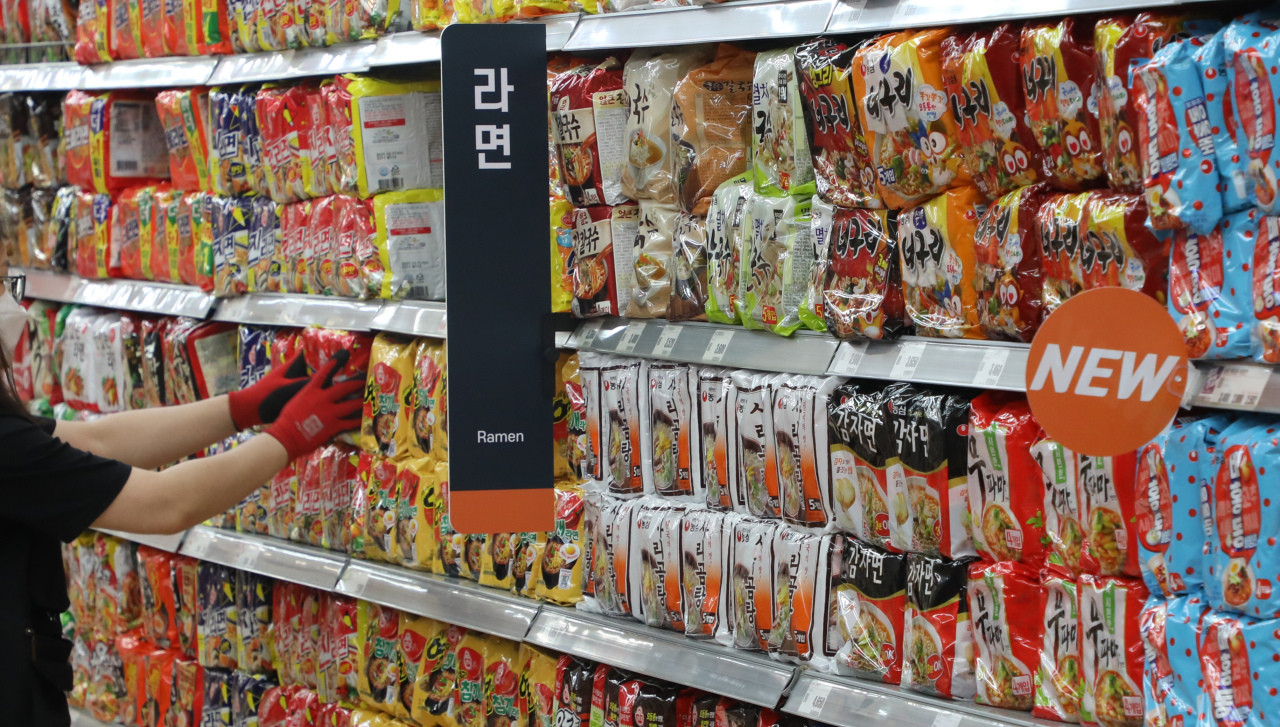Korean food exports soar to record high amid pandemic
On back of Oscar-winning film ‘Parasite,’ shipment of instant noodles surges 30%
By Jie Ye-eunPublished : May 27, 2021 - 15:38

South Korea’s food exports advanced 14.6 percent on-year in 2020, despite an overall export slump on the back of the lingering pandemic, customs data showed Thursday.
Overseas shipments reached an all-time high of $4.28 billion last year, compared with $3.73 billion posted in 2019, according to the Korea Customs Service. Livestock and fishery products were not counted in the figures, and neither were alcohol or other beverages.
The upward trend continued so far this year, amounting to $1.59 billion in the January-April period, up 18.3 percent from a year earlier, the data showed.
The customs agency attributed the soaring figures to three factors -- growing demand for quick meals at home, the rising value of Korean food as cultural products and the increased popularity of traditional fermented food.
Buoyed by Oscar winner “Parasite,” overseas sales of instant noodles rose 29.2 percent to $604 million. Overseas sales of processed rice products and frozen dumplings, called mandu here, jumped 53.3 percent to $37 million and 46.2 percent to $51 million, respectively.
Exports of tteokbokki, a Korean street food consisting of rice cakes in a chili sauce, surged 56.7 percent to $54 million as globally popular K-pop acts introduced the food on social media. Exports of sauces shot up 33.6 percent to $167 million as well.
Exports of kimchi, Korea’s traditional fermented cabbage dish, grew 37.6 percent to $145 million. Overseas shipments of fermented red chili pepper sauce, or “gochujang,” and fermented soybean paste, or “doenjang,” increased 35.2 percent and 29.1 percent, respectively.
The US has become the biggest buyer of Korean foods, importing $798 million last year, up 33.3 percent from a year earlier. China was next with $740 million. Japan, which had been the largest importer until 2019, slipped to No. 3 with $723 million.
“Exports of Korean foods have been on a continuous surge each year in line with boosting popularity of the Korean Wave. We were worried about a possible negative impact of the pandemic (on the export figure) last year, but new demands from the crisis have resulted to an improved outcome,” a KCS official said.
By Jie Ye-eun (yeeun@heraldcorp.com)
Overseas shipments reached an all-time high of $4.28 billion last year, compared with $3.73 billion posted in 2019, according to the Korea Customs Service. Livestock and fishery products were not counted in the figures, and neither were alcohol or other beverages.
The upward trend continued so far this year, amounting to $1.59 billion in the January-April period, up 18.3 percent from a year earlier, the data showed.
The customs agency attributed the soaring figures to three factors -- growing demand for quick meals at home, the rising value of Korean food as cultural products and the increased popularity of traditional fermented food.
Buoyed by Oscar winner “Parasite,” overseas sales of instant noodles rose 29.2 percent to $604 million. Overseas sales of processed rice products and frozen dumplings, called mandu here, jumped 53.3 percent to $37 million and 46.2 percent to $51 million, respectively.
Exports of tteokbokki, a Korean street food consisting of rice cakes in a chili sauce, surged 56.7 percent to $54 million as globally popular K-pop acts introduced the food on social media. Exports of sauces shot up 33.6 percent to $167 million as well.
Exports of kimchi, Korea’s traditional fermented cabbage dish, grew 37.6 percent to $145 million. Overseas shipments of fermented red chili pepper sauce, or “gochujang,” and fermented soybean paste, or “doenjang,” increased 35.2 percent and 29.1 percent, respectively.
The US has become the biggest buyer of Korean foods, importing $798 million last year, up 33.3 percent from a year earlier. China was next with $740 million. Japan, which had been the largest importer until 2019, slipped to No. 3 with $723 million.
“Exports of Korean foods have been on a continuous surge each year in line with boosting popularity of the Korean Wave. We were worried about a possible negative impact of the pandemic (on the export figure) last year, but new demands from the crisis have resulted to an improved outcome,” a KCS official said.
By Jie Ye-eun (yeeun@heraldcorp.com)









![[Graphic News] More Koreans say they plan long-distance trips this year](http://res.heraldm.com/phpwas/restmb_idxmake.php?idx=644&simg=/content/image/2024/04/17/20240417050828_0.gif&u=)
![[KH Explains] Hyundai's full hybrid edge to pay off amid slow transition to pure EVs](http://res.heraldm.com/phpwas/restmb_idxmake.php?idx=644&simg=/content/image/2024/04/18/20240418050645_0.jpg&u=20240419100350)







![[KH Explains] Hyundai's full hybrid edge to pay off amid slow transition to pure EVs](http://res.heraldm.com/phpwas/restmb_idxmake.php?idx=652&simg=/content/image/2024/04/18/20240418050645_0.jpg&u=20240419100350)

